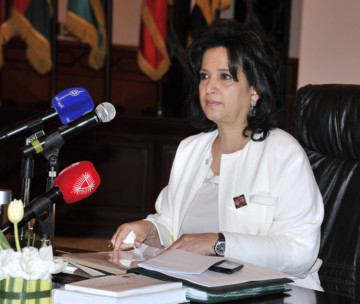
Manama: Bahrain’s Prime Minister Prince Khalifa Bin Salman Al Khalifa has cancelled a circular issued by the culture minister in which she ordered women staff not to wear the abaya — the loose-fitting full-length cloak worn by women throughout the Gulf — to work.
The cancellation was ordered a few hours after Shaikha Mai Bint Mohammad Al Khalifa issued the circular on Thursday afternoon.
Measures should be taken to ensure that female staff can wear their abayas to work, the premier’s orders said.
Prince Khalifa’s decision was immediately praised by Al Menbar Islamic Society.
“The prompt response by Prince Khalifa to calls and pleas to reconsider the minister’s decision has defused the tension that was swelling up among culture ministry female staff and the people,” Ali Ahmad, the secretary general of the society and the head of its bloc in the parliament, said. “The Civil Service does not have any stipulations for a dress code and therefore, there can be no administrative decisions to force employees to wear specific clothes.”
Most women in the Gulf wear the traditional abayas and the minister’s decision was an indirect insult to them, he added.
“It is a way of life across the Arabian Gulf and it should be respected. We are grateful the Prime Minister’s decision rectified the situation,” he said.
In her circular, Shaikha Mai, the first woman to hold the culture portfolio in Bahrain, said that the overall looks of the staff as representatives of the ministry were a significant component of their professional performance.
All staff should be fully committed to an appropriate dress code that reflects the civilized image of the ministry, the circular said.
Under the dress code in the minister’s decision, men should wear eitehr the national dress (the traditional thobe, or kandura, and a ghutra) or western clothes, including a tie and shoes. The shoe clause eliminates the tendency by some men to wear sandals, even when wearing Western style clothes. No clothes that would demean the professional status at the ministry would be allowed, it said.
Women have the right to wear appropriate modest dresses, but must avoid wearing the abayas during the working hours, the circular said.
Images of the circular went viral on the social networks, prompting an intense debate over its merit and timing and calls to annul it.
Sources said that the minister’s decision was taken after she noticed that some of the women staff were “not properly attired under the abayas” and that some of the men did not pay enough attention to the way they looked.
Shaikha Mai, one of three women in the government, is praised and criticised in equal measures in Bahrain and warmly applauded abroad for her cultural activities.
Popular among intellectuals and writers for her efforts to promote culture in Bahrain, she has been particularly instrumental in establishing several private institutions by buying and restoring old buildings, mainly in Muharraq, the traditional area of artistic activities in Bahrain. She has regularly organised events to highlight the contributions of poets, intellectuals and thinkers. Her connections with cultural institutions and personalities and her devotion to international activities have earned her international respect.
However, she also had several standoffs with conservative MPs and religious groups over her work and was relentlessly criticised “for challenging local values and traditions and promoting onerous and useless activities under the banner of culture”.
In 2012, several MPs called upon the minister to suspend all cultural events, arguing that Bahrain should show compassion and sympathy with the people suffering in Syria.
However, she resisted their calls, insisting on the significance of culture in promoting dialogue and interaction with other countries and civilisations.
The standoff was compounded when reports emerged that a mosque across a narrow street from the Shaikh Ebrahim Cultural Centre, where cultural activities were held, was asked to avoid using loudspeakers and not to call for prayers.
The reports were denied, but Islamists’ groups used them to attack the Spring of Culture Festival, an annual event held in March.
She courted controversy in 2007 after a parliamentary ad-hoc panel pronounced her guilty of gross negligence by allowing a Lebanese dance troupe to stage a “sexually-charged and depraved show” during the Spring of Culture festival.












